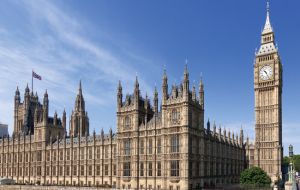MercoPress. South Atlantic News Agency
“Rethink devolution” as a result of Brexit, Westminster and Scotland coincide
 Westminster's constitutional affairs committee said ministers should engage more and set out policies more clearly
Westminster's constitutional affairs committee said ministers should engage more and set out policies more clearly  Scottish and Welsh ministers Nicola Sturgeon and Carwyn Jones have regularly coordinated their opposition to the UK government's approach to Brexit
Scottish and Welsh ministers Nicola Sturgeon and Carwyn Jones have regularly coordinated their opposition to the UK government's approach to Brexit  UK law officers have challenged Holyrood's own Brexit bill in the Supreme Court, which is considering whether legislation was within the devolved parliament's remit
UK law officers have challenged Holyrood's own Brexit bill in the Supreme Court, which is considering whether legislation was within the devolved parliament's remit The UK government “must rethink devolution” as a result of Brexit, a group of MPs have recommended. The process of leaving the EU has sparked a series of clashes between UK government ministers and their counterparts in Scotland and Wales.
Westminster's constitutional affairs committee said ministers should engage more and set out policies more clearly. The Scottish government has also called for a new “arrangement” for devolution in light of the recent Brexit rows. The UK government says it is committed to devolution and giving a voice to each part of the United Kingdom.
Scottish and Welsh ministers have regularly coordinated their opposition to the UK government's approach to Brexit, with first ministers Nicola Sturgeon and Carwyn Jones issuing joint statements and backing each other in the defense of devolved powers.
Earlier in July, ministers united to complain that they had not been given a “meaningful opportunity” to contribute to the UK's negotiating position after “unsatisfactory” talks.
And while the Welsh government eventually came to a deal with UK ministers over the EU Withdrawal Bill, MSPs in Scotland voted not to give their consent to the Westminster legislation - and could do so for future Brexit bills.
Meanwhile, UK law officers have challenged Holyrood's own Brexit bill in the Supreme Court, with judges currently considering whether the legislation was within the devolved parliament's remit.
Members of the constitutional affairs committee - including Conservative, Labour, SNP and independent MPs - said there had been “a significant erosion of trust between the UK government and the devolved administrations”.
They said that because devolution was established in the context of EU membership, Brexit has thrown up a series of new “constitutional questions and ambiguities” which must be addressed. They recommended ministers set out a “devolution policy for the union” to answer some of these questions.
The committee also said it was “highly regrettable that there was little consultation with the devolved governments over the EU Withdrawal Bill”, saying this “could have avoided much of the acrimony that was generated”.
And the MPs said there was “considerably ambiguity” around the Sewel convention - the principle that Westminster would “not normally” legislate in devolved areas without consent. They recommended that “clear statements of circumstances under which legislative consent is not required by the convention be set out”.
The committee's chairman, Conservative MP Sir Bernard Jenkin, said more attention also needed to be paid to the place of England and its various regions in the constitution.
He said: “We recommend the government sets out a clear devolution policy for the union as we leave the EU. Failure to do this just prolongs misunderstandings which are the basis for more conflict.
”The present machinery for developing inter-governmental relations is flimsy, and there is nothing to give the various parts of England a say. Ignoring this risks the future relations within the UK.“
Ronnie Cowan, the SNP member on the committee, added: ”This report highlights the lack of trust, confidence and the divisions within the UK government itself - as well as a system of inter-governmental relations in the UK which is simply not fit for purpose in the aftermath of the Brexit referendum.
“'If the Tories had engaged with the devolved administrations after the Brexit referendum and had a grown-up conversation that allowed for input and constructive criticism, then we could be in a very different place.”
A Scottish government spokesman said: “We are committed to securing a deal that works for the entire United Kingdom and have been absolutely clear that when devolved powers are returned from Brussels, the vast majority will go straight to the devolved administrations”.




Top Comments
Disclaimer & comment rulesCommenting for this story is now closed.
If you have a Facebook account, become a fan and comment on our Facebook Page!